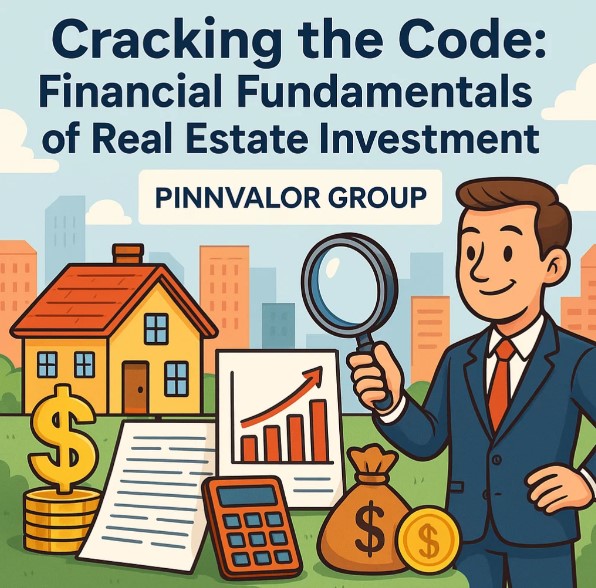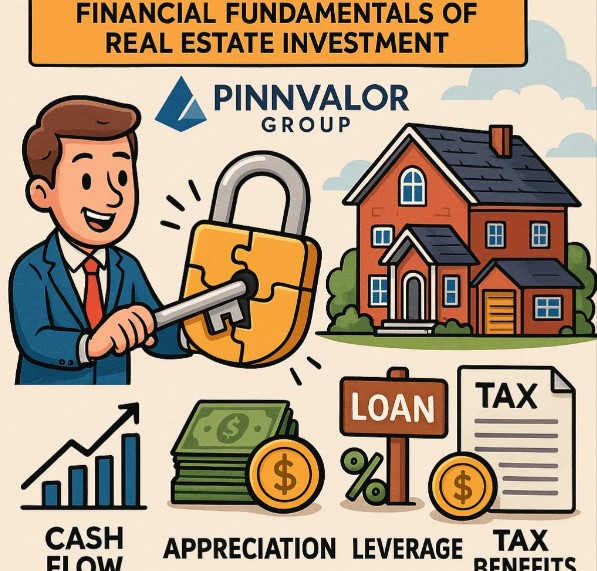
🏗️ Cracking the Code: Financial Fundamentals of Real Estate Investment
When it comes to real estate investing, success isn’t just about location—it’s also about mastering the numbers. Financial literacy in property investment is the bedrock of profitability, risk management, and long-term wealth creation. Whether you’re a beginner or a budding investor, this deep dive into the financial fundamentals will help you crack the code.
Is your investment strategy driven by data or just driven by dreams?
Behind every successful real estate investor is a sharp understanding of financial fundamentals. Because intuition builds interest, but only insight builds income.
1. Understanding the Financial Blueprint
Before diving into individual metrics, it's essential to grasp the broader structure of real estate investment analysis. This typically involves:
- Acquisition Costs (purchase price, closing costs, renovation)
- Operating Income & Expenses
- Financing Costs
- Cash Flow & ROI
Each of these layers plays a critical role in determining whether a property will be a financial asset or liability.
2. Key Financial Metrics Every Investor Should Know
1. Net Operating Income (NOI)
NOI is the revenue a property generates after deducting all operating expenses (excluding financing costs).
Formula: Net Operating Income = Gross Rental Income – Operating Expenses
Why it matters: It reflects the property's profitability and is crucial for calculating valuation and returns.
2. Cap Rate (Capitalization Rate)
Cap Rate helps compare the return on investment between properties or markets.
Formula: Cap Rate = NOI / Purchase Price
Why it matters: A higher cap rate can indicate a better return, but also potentially higher risk.
3. Cash-on-Cash Return
This measures the annual return on the actual cash invested.
Formula: Cash-on-Cash Return = Annual Pre-Tax Cash Flow / Total Cash Invested
Why it matters: It gives a clear picture of short-term return, especially for leveraged investments.
4. Internal Rate of Return (IRR)
IRR evaluates the total expected return over the holding period, considering the time value of money.
Why it matters: Helps compare real estate with other investment types and projects with varying time horizons.
3. The Role of Leverage
Real estate is one of the few investment classes where leverage (debt) is common—and often encouraged. However, this comes with responsibility.
Loan-to-Value Ratio (LTV)
Formula: LTV = Loan Amount / Property Value
A higher LTV increases financial risk but may enhance returns. Careful planning ensures leverage works for you, not against you.
4. Managing Operating Expenses
Ongoing expenses directly impact profitability:
- Property taxes
- Maintenance & repairs
- Insurance
- Property management fees
- Utilities (if not tenant-paid)
Efficient expense management helps preserve NOI and long-term property value.

5. Depreciation and Tax Benefits
Real estate offers unique tax benefits through depreciation:
- Residential properties are depreciated over 27.5 years
- Commercial properties over 39 years
This “paper loss” can offset taxable income, reducing the investor's tax liability—one of the key reasons real estate is favored by high-net-worth individuals.
6. Exit Strategy Financials
Profitable investing isn’t just about buying—it's also about knowing when and how to exit:
Equity Buildup:
As the loan gets paid down, your equity grows, enhancing your resale value.
Appreciation:
Long-term value growth boosts profit margins at sale.
1031 Exchange:
Allows reinvestment of gains without immediate tax liability, preserving capital for scaling.
7. Red Flags in Real Estate Financials
Watch out for these warning signs:
- NOI not covering debt service
- Overestimated rent projections
- Underestimated repair reserves
- Negative cash flow masked by appreciation assumptions
Sound financial planning requires conservative assumptions and rigorous due diligence.
Conclusion
Cracking the financial code in real estate isn’t about guesswork—it’s about discipline, metrics, and strategic thinking.
Mastering these fundamentals gives you the confidence to analyze deals, navigate risks, and ultimately build sustainable wealth through property investment.
